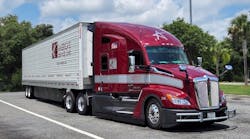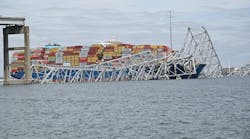SAN DIEGO. Despite the economic and emission regulation upheavals experienced by fleet owners in recent years, more changes are ahead for their trucks as OEMs intensify their focus on making equipment more efficient to operate. “This year has signaled a slight turnaround from a nearly three-year trucking and economic slump,” said David Siler, general manager/central region for Freightliner Trucks, here at Integer Research’s Diesel Emissions Conference & Diesel Exhaust Fluid Forum.
“But 2010 also marks a new beginning, we hope, for a future of challenging yet manageable improvements in the way trucks perform and fulfill their duties in this world of resource scarcity, with an emphasis on sustainability,” he added.
Siler said Freightliner Truck’s parent, Daimler Trucks North America (DTNA), projects that 2011 will be about 20% better in terms of new vehicle sales, growing to sales of 160,000 Class 8 units by 2012 and nearly 200,000 units annually by 2013. That growth will be due largely to replacement of aging equipment. He noted the average age of Class 8 trucks in U.S. fleets is now 6.5 years – the highest it’s been in 30 years.
Yet more technological changes are on the way for trucking equipment, said Siler, mainly in response to soon-to-be-announced regulatory efforts to impose fuel economy standards on heavy- and medium-duty commercial vehicles. Daimler is planning internally to improve the fuel efficiency of its Class 8 trucks 20% between now and 2020, with a five-year goal to boost freight efficiency by 33%, Siler said.
“That may sound ambitious, but it’s actually within our grasp,” he said. “For example, Daimler sees significant opportunities to improve freight efficiency through the allowance of heavier loads and slower speeds where safe and feasible.”
By boosting allowable truck weight on U.S. roads to 100,000 lbs, for instance, would consolidate many trips requiring two trucks into one. And decreasing average road speed from 68 mph to 58 mph would further reduce fuel consumption, Siler explained, as running slower requires less energy.
New technologies are also being brought into the mix to boost fuel economy, he said, pointing to the company’s involvement with the U.S. Dept.of Energy’s “SuperTruck” program.
“We expect engine improvements to represent a little less than half the improvement in fuel economy from this program, with chassis and total vehicle changes responsible for more than half,” Siler told FleetOwner.
Recovery of waste heat from the exhaust stream is one such measure. He explained that heat re-routed to power a small “steam engine” of sorts to recharge batteries or power other devices will reduce the parasitic load on the truck’s main engine.
Another new technology Siler said Freightliner is working on is dubbed “Predictive Cruise.” It would enable a truck to automatically optimize engine power based on data concerning road conditions well ahead of the vehicle.
“This system would allow the engine to operate more ‘intelligently’ and thus optimize fuel usage that much better,” he said. “When you add a host of incremental steps together like this – along with the 5% gain in fuel economy we’ve gained through the use of selective catalytic reduction – then a 20% gain in fuel economy over the next 10 years is not out of reach.”




